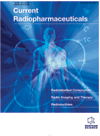-
s Radiotracers in Oncology
- Source: Current Radiopharmaceuticals, Volume 5, Issue 2, Apr 2012, p. 79 - 89
-
- 01 Apr 2012
Abstract
Radiopharmaceuticals are able to give functional information about systems, organs or cells. This functional information can be about different cell mechanisms or molecular pathways. In terms of systems or organs this information can be assessed through biodistribution studies while that in terms of cells can be evaluated through more detailed research, like calculation of influx and efflux indexes or binding studies. Moreover recent advances in understanding the molecular mechanisms underlying the disease, allow the diagnosis in early stages of the disease, sometimes several months before the onset of morphological changes that translate the disease. These approaches are especially important in oncology. The nuclear medicine allows to map and to quantify the local changes related to the metabolic pathways involved in malignant transformation or in the tumoral proliferation. We made a longitudinal approach of the development of the malignant transformation and we show how it is possible to evaluate some metabolic steps using the nuclear medicine to get information not only about the functional situation of tumoral tissue but also about its therapeutic response. Therefore, covering different issues like tumor proliferation, tumor metabolism, tumor angiogenesis, tumor hypoxia, apoptosis, tumor receptors and multidrug resistance it is possible to confirm the important role of nuclear medicine on the detection, treatment and cancer follow-up.


